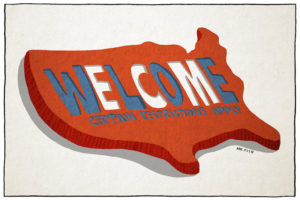American Companies Fight For Right to Bleed China
In the face of vast poverty and exploitation, the Chinese government is about to enact a labor law that would strengthen the role of unions and protections for workers. But American corporations, eager to maintain their fiefdoms in the middle kingdom, have lobbied fiercely against the proposed legislation.
In the face of vast poverty and exploitation, the Chinese government is about to enact a labor law that would strengthen the role of unions and protections for workers. But American corporations, eager to maintain their fiefdoms in the middle kingdom, have lobbied fiercely against the proposed legislation.
A group called the American Chamber of Commerce has led the charge against the humanitarian reforms, representing companies that include Dell, Ford, General Electric, Microsoft and Nike.
New York Times:
WAIT BEFORE YOU GO...Under China’s “iron rice bowl” system of the 1950’s and 60’s, all workers were protected by the government or by state-owned companies, which often supplied housing and local health coverage.
But by the 1980’s, when the old Maoist model had given way to economic restructuring and the beginning of an emphasis on market forces, China began eliminating many of those protections — giving rise to mass layoffs, unemployment, huge gaps in income and pervasive labor abuse.
The worst off have been migrant workers, most of them exiles from the poorest provinces who travel far from home to live in cramped company dormitories while working long hours under poor conditions.
Migrant workers in virtually every city complain about abuses like having their pay withheld or being forced to work without a contract.
This year, the ground feels uncertain — facts are buried and those in power are working to keep them hidden. Now more than ever, independent journalism must go beneath the surface.
At Truthdig, we don’t just report what's happening — we investigate how and why. We follow the threads others leave behind and uncover the forces shaping our future.
Your tax-deductible donation fuels journalism that asks harder questions and digs where others won’t.
Don’t settle for surface-level coverage.
Unearth what matters. Help dig deeper.
Donate now.






You need to be a supporter to comment.
There are currently no responses to this article.
Be the first to respond.